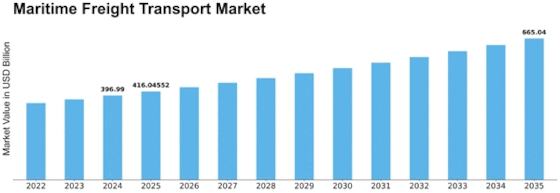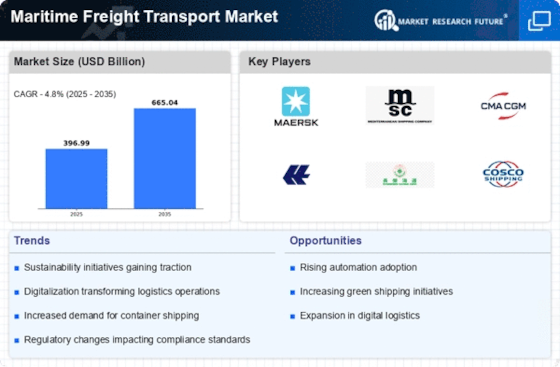Maritime Freight Transport Size
Maritime Freight Transport Market Growth Projections and Opportunities
The Maritime Freight Transport market is subject to a multitude of market factors that collectively influence its dynamics and growth. A pivotal factor is global trade patterns. The volume of international trade significantly impacts the demand for maritime freight transport services. Economic growth, consumer demand, and manufacturing activities across different regions contribute to fluctuations in shipping requirements. The market is intricately linked to the ebb and flow of global trade, with geopolitical events, trade agreements, and economic conditions playing a critical role in shaping its trajectory.
The global Maritime Freight Transport market is accounted to register a CAGR of 4.80% during the forecast period and is estimated to reach USD 551.2 billion by 2032.
Technological advancements are transforming the Maritime Freight Transport industry. The integration of digital technologies, automation, and data analytics has enhanced the efficiency and transparency of shipping operations. From advanced navigation systems to real-time tracking of cargo, technology plays a crucial role in optimizing maritime logistics. Companies in the sector must continually invest in and adapt to these technological innovations to remain competitive and meet the evolving expectations of their customers.
Environmental considerations have become increasingly influential in the Maritime Freight Transport market. With growing awareness of climate change, there is a rising emphasis on sustainable and eco-friendly shipping practices. Stringent environmental regulations and a push towards cleaner fuels are impacting the industry. Companies are investing in more fuel-efficient vessels, exploring alternative energy sources, and adopting measures to reduce their carbon footprint. Sustainability is emerging as a key factor that not only aligns with global environmental goals but also resonates with environmentally conscious consumers and stakeholders.
Geopolitical factors play a significant role in the Maritime Freight Transport market. Political stability, international relations, and maritime disputes can affect trade routes and impact the efficiency and reliability of shipping. The industry must navigate geopolitical complexities to ensure the smooth flow of goods across borders. Changes in trade policies, tariffs, and diplomatic relations can introduce uncertainty, influencing the strategic decisions of maritime freight transport companies.
Regulatory compliance is a critical consideration in the industry. Maritime transport is subject to a complex web of international regulations governing safety, security, and environmental protection. Adherence to these regulations is not only a legal requirement but also a key aspect of maintaining the industry's credibility and reliability. Companies must invest in compliance measures, including safety protocols, emissions controls, and security measures, to operate within the framework of international maritime law.
Market competition is fierce within the Maritime Freight Transport sector. Companies vie for market share by offering efficient and reliable shipping solutions, competitive pricing, and a global network of routes. The ability to provide value-added services such as real-time tracking, cargo consolidation, and intermodal transportation options is crucial for success. Additionally, building strong relationships with shippers, port authorities, and customs officials is essential for navigating the complexities of global logistics.



















Leave a Comment